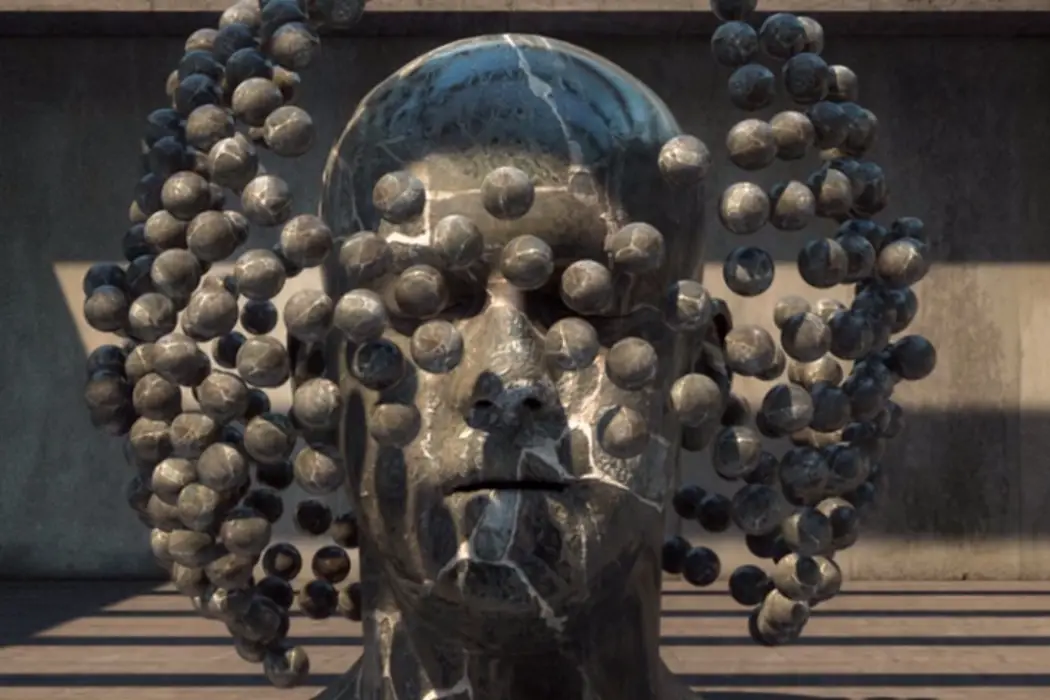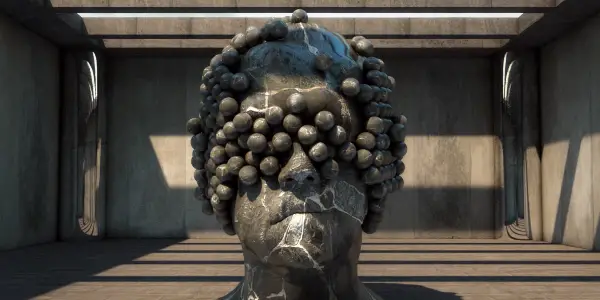THE FLYING FISH: An Ode To The Endless Possibilities Of Animation

Zoe Crombie is a Film Studies student from Lancaster University,…
In 2019, it’s hard to be too floored by what once was the mysterious magic of computer-aided effects. Our eyes have been trained for decades now to spot the little inconsistencies that out a detailed image as a weightless phantom. So rather than doubling down on this quest to ground CGI in reality, The Flying Fish explores the more surreal realms of our existence that lights and cameras alone struggle to conjure up alone.
Themes And Motifs
Though The Flying Fish lacks a narrative in the conventional sense, it seeks to depict arguably the longest-running narrative possible: that of human progress. Beginning with a myriad of mysterious orbs carving out a human head, what follows is a surreal range of imagery that invites you to create a story within it. Colours, textures, and sweeping camera angles all fly across the screen, with the one remaining constant being the motif of the human form as it molds and adapts to its surroundings, followed by the mysterious flying fish of the title.
Visual Mastery
When conversations so often revolve around the minutia of CGI – how many hairs on a character’s head, the realism of a skin texture, etc. – it’s refreshing here to see that the visual flair is generated through other means. The models and animations may not be the slickest or most polished out there, but the way director Murat Sayginer composes them into a cohesive whole is breathtaking. Humans and other creatures morph into distant galaxies through motions as fluid as water, assisted by the unbelievably precise editing, which uses graphical matches to incredible effect in wordlessly conveying meaning.

As well as a more vague statement on the nature of progress in the universe, The Flying Fish similarly brings attention to the concept of building blocks – minuscule particles making up an expansive whole. Within live-action cinema, the parts you can work with tend to be people, places, and ready-made objects, but when creating an animated film, you have to build every single conceivable element from the ground up. Funnily enough, this is how the world truly works, as, despite frequent insistence that live-action films are closer to reality, we exist in a universe containing so much complexity we can barely comprehend it.
Conclusion: The Flying Fish
As the effort of a large team, The Flying Fish would be an interesting, experimental short. But within the context of being the work of a single man over the course of an intense seven-year travail, the film is transformed into exactly what it intends to represent: a journey of monumental proportions.
What do you think? Do you have a different interpretation of The Flying Fish? Let me know in the comments!
The Flying Fish premiered in Turkey on August 13, 2019.
Does content like this matter to you?
Become a Member and support film journalism. Unlock access to all of Film Inquiry`s great articles. Join a community of like-minded readers who are passionate about cinema - get access to our private members Network, give back to independent filmmakers, and more.
Zoe Crombie is a Film Studies student from Lancaster University, who has been writing for Film Inquiry since May 2018 as well as at her own site Obsess Reviews. She is a big fan of Studio Ghibli and The Marx Brothers, but is willing to watch anything and everything.













